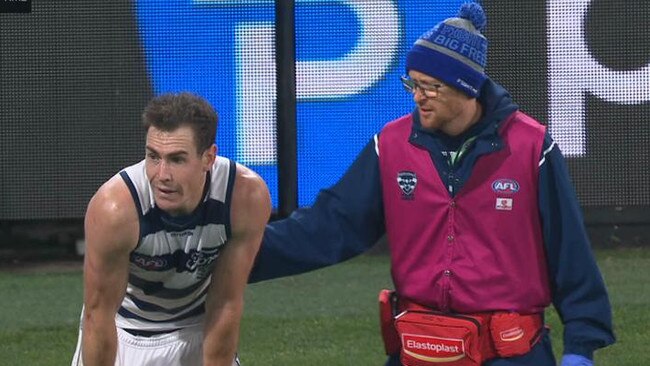AFL players believe revealing concussions could end their careers
AFL players are hiding concussions because of a fear of missing games, with some even believing disclosing their head-knock symptoms could ultimately jeopardise their contracts, new survey reveals.

AFL players are hiding concussions because of a fear of missing games, with some even believing disclosing their head-knock symptoms could ultimately jeopardise their contracts.
The 2023 AFL Players Association Insights & Impact Report released to The Australian has for the first time drilled down on the “trend” of players not reporting their concussion symptoms – with the predominant reason being the fear of missing games due to the mandatory 12-day recovery period.
The detailed AFLPA report, which surveyed all players in the AFL, also revealed the second-most common reason was that AFL players perceived their symptoms to be of “low severity” – this reasoning was most often given by older players with nine or more years of experience.
Players from the entire AFL cohort were asked why they thought some players might be “unwilling” to report potential concussion, with the most frequently suggested reasons including “concerns over missing games due to potential contract incentives or triggers, or the risk of missing out on team selection”.
AFLPA chief Paul Marsh said the data reinforced that concussion was the burning issue in the game, and he called for more education and better safety measures for all footballers when it came to head knocks – and care for those retired players who were suffering.
“Concussion has rapidly emerged as the pre-eminent issue in the game and one that is impacting the long-term health and wellbeing of past players,” Marsh said. “It also has serious implications for the current playing group as well as the potential to dramatically alter the foundations of Australian football as a sport.
“In our view there needs to be two areas of focus: making the game as safe as possible for current and future players, and supporting past players who are still suffering from the impacts of concussion sustained during their playing career. It’s important the industry continues to invest time and resources in both as a priority.”
The AFL is facing a class action lawsuit with more than 100 former players, including Geelong premiership player Max Rooke and goalkicking great Gary Ablett, suing for brain injuries they claim they sustained during their career.
The latest AFLPA report again confirmed that concussion continues to be the major issue for the AFL cohort, with 71 per cent stating they are “concerned” about the long-term effects.
The survey showed 24 per cent (179 players) told the AFLPA they had experienced a concussion. And of those 179 players, 12 per cent said they did not report their symptoms (which equates to 21 players).
The longer an AFL player had played, the more likely they were to be concerned about the long-term impacts of concussion.
The AFLPA’s report states this “heightened awareness” among veteran players may stem from more extensive exposure to “sports-related concussion” education or increased consideration of post-career health.
Yet AFLW players who did not report mostly cited that they didn’t recognise the symptoms as potential concussion, or thought them to be minor. In the AFLW, there were 114 players who said they had experienced a diagnosed or potential concussion in the past 12 months. Of those, 11 players (10 per cent) did not report their symptoms.
Repetitive head knocks have been scientifically linked to the brain disease chronic traumatic encephalopathy, with St Kilda champion Danny Frawley and Richmond’s Shane Tuck – who both took their own lives – found to have the disease post-mortem.
Marsh said it was incumbent “on us all” to support past players who may be going through “neurological issues relating to their service to the competition, clubs and fans”.
“Our understanding of the impact of concussion and head knocks is evolving, but there’s much more we can do to adjust rules, improve medical processes and procedures, increase quality research and diagnosis, and enhance player education,” Marsh said. “These are all important levers we can pull to mitigate risks for players who play our great game,” Marsh added.
“The AFLPA has long acknowledged, advocated for and supported past players and, through recent CBA negotiations, secured extra funding in part to help alleviate the struggles of our alumni members.”
The issue of concussion management was again thrust into the spotlight last Friday night when Geelong forward Jeremy Cameron appeared to wave away a club doctor after falling heavily in the Cats’ match against Port Adelaide.
The Cats have given a detailed explanation of why Cameron played out the game, saying he showed no immediate symptoms.
Cameron suffered delayed symptoms a day after he played. The incident has again raised the issue of implementing independent doctors to monitor concussions in the AFL.
While the NRL has independent doctors – the AFL has refused to embrace the initiative. It was a key recommendation after the coronial inquiry into Tuck’s death at 38.
Judge John Cain Jr, who led that inquiry, made 21 recommendations, including that the AFL and AFLW reduce full-contact training sessions for the pre-season, regular and off-season by 2025 and employ independent doctors.
He also recommended independent concussion spotters, who watch games from the media box, be empowered to remove players from the field for medical assessment.
During the inquiry, Boston University’s Bob Cantu said CTE was “most closely correlated not with the number of concussions sustained but rather with the amount of repetitive head trauma someone has accumulated”.
With this in mind, the Victorian coroner said the AFL should reduce full-contact training in order to reduce the amount of sub-concussive head injury – a bump to the head that doesn’t cause symptoms – players are exposed to on the field. The AFL is yet to reduce contact in training.






